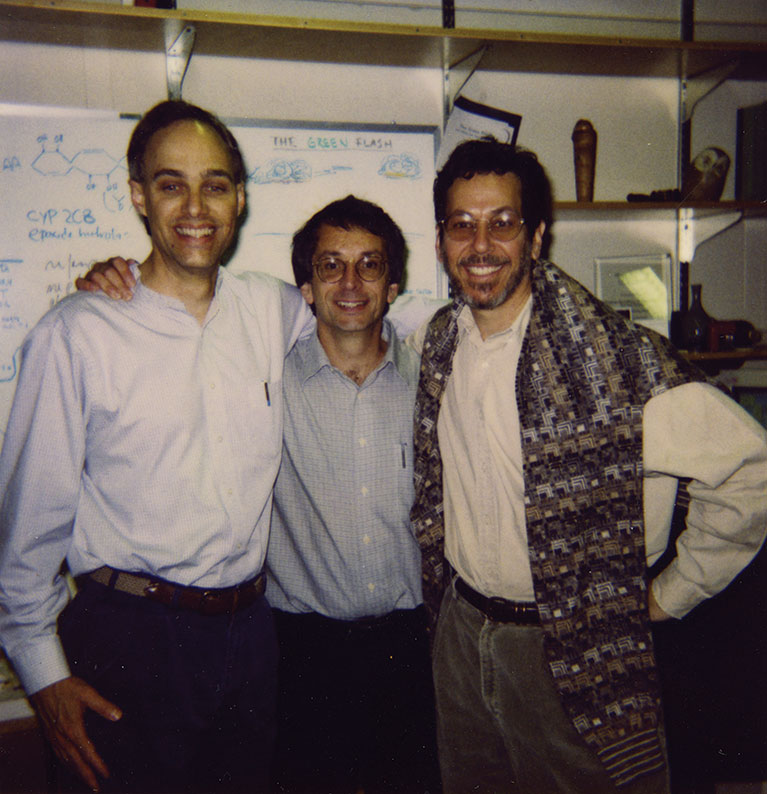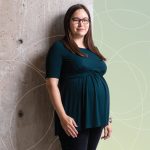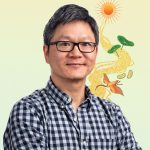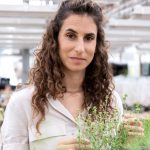Alumni Journeys Richard Heyman From Salk to biotech and back
When Salk Trustee Richard Heyman was a freshman in college, his mother was diagnosed with advanced breast cancer. The available therapies at the time were not promising, and the family braced itself for the worst. She underwent extensive surgery and radiation therapy, and luckily, she survived.
“My mother beat the odds, and later even became a cancer patient advocate,” says Heyman. “Her story continues to inspire my work to develop new cancer therapies.”
Heyman is a scientist and entrepreneur who has founded numerous biotechnology companies aimed at developing new therapies for cancers and other diseases. He currently serves as the vice chair of Salk’s Board of Trustees, but Heyman’s Salk story actually began when he was a National Institutes of Health postdoctoral researcher in the lab of Professor Ronald Evans. After earning his PhD in pharmacology from the University of Minnesota, Heyman joined the Evans team to study the molecular machinery that controls signaling pathways linked with cancer and other human diseases.
“I had the ability to collaborate with brilliant scientists, like Ron [Evans], and apply foundational and basic research to the discovery of new therapies that benefit humankind. It was a different path than I had originally intended, but my ultimate goal was still the same—to help people.”
–Richard Heyman

“I loved the biotech world, where I could build and workwith amazing multidisciplinary teams. I had the ability to collaborate with brilliant scientists, like Ron, and apply foundational and basic research to the discovery of new therapies that benefit humankind,” says Heyman. “It was a different path than I had originally intended, but my ultimate goal was still the same—to help people.”
Heyman was later promoted to vice president of research at Ligand, and over the course of his tenure, the Ligand team developed multiple FDA-approved treatments for cancer. Heyman went on to cofound X-Ceptor Therapeutics, Aragon Pharmaceuticals, and Seragon Pharmaceuticals, among others. X-Ceptor focused on the development of treatments for metabolic diseases, while Aragon and Seragon both focus on hormone-dependent cancers, including breast cancer and prostate cancer (one of these therapies, Erleada, is now FDA-approved for the treatment of prostate cancer).
Heyman’s efforts have earned him numerous awards, including the Ernst and Young San Diego Regional Entrepreneur of the Year award, the UCSD Rell Sunn Award, and the Endocrine Society Outstanding Innovation Award. He is also the author or inventor of more than 125 publications and patents.
“Salk was such an impactful place for me,” says Heyman. “I was delighted when one of Salk’s former presidents reached out to ask if I would serve as a Trustee. It was, and still is, a true honor.”
Heyman originally began serving as a member of the Salk Board of Trustees. Now, in his role as vice chair, he works closely with Salk’s leadership and other Board members to support Salk’s mission of “big science”—large-scale, innovative approaches that solve societal problems. “You have to ask big questions if you want big answers,” says Heyman.
“The future of Salk is bright. We need to continue to unlock the secrets of life for the benefit of humankind. And I’m really excited about supporting the young scientists at the Institute. These young scientists are the future of Salk.”
Support a legacy where cures begin.
Featured Stories
 Leading with Technology – Salk scientists develop new means of discoveryOur scientists continue to push technological limits to—among other things—store more excess atmospheric carbon in deeper plant roots, study pancreatic cancer more accurately, follow cellular activity in real time more clearly, and track all kinds of motion more easily.
Leading with Technology – Salk scientists develop new means of discoveryOur scientists continue to push technological limits to—among other things—store more excess atmospheric carbon in deeper plant roots, study pancreatic cancer more accurately, follow cellular activity in real time more clearly, and track all kinds of motion more easily. Dannielle Engle—Putting patients firstEngle, an assistant professor, has a deeply personal connection to pancreatic cancer that changed her career trajectory and made her want to focus on the disease. Inside Salk sat down with Engle to find out more about her dedication to finding better treatment options.
Dannielle Engle—Putting patients firstEngle, an assistant professor, has a deeply personal connection to pancreatic cancer that changed her career trajectory and made her want to focus on the disease. Inside Salk sat down with Engle to find out more about her dedication to finding better treatment options.
 Weiwei Fan—Life is energyFan, a staff scientist in Professor Ronald Evans’ lab, studies mitochondria because he feels drawn to understanding how these energy generators within our cells function and the natural variations that exist between individuals.
Weiwei Fan—Life is energyFan, a staff scientist in Professor Ronald Evans’ lab, studies mitochondria because he feels drawn to understanding how these energy generators within our cells function and the natural variations that exist between individuals. Natanella Illouz-Eliaz—Recipe for a plant biologist: tomatoes, failure, and perseveranceIllouz-Eliaz, a postdoctoral researcher in Professor Joseph Ecker’s lab, grew up in Israel near the border with Lebanon, where high-pitched sirens periodically drove her family into bomb shelters for safety. But her parents insisted that she get the best education possible.
Natanella Illouz-Eliaz—Recipe for a plant biologist: tomatoes, failure, and perseveranceIllouz-Eliaz, a postdoctoral researcher in Professor Joseph Ecker’s lab, grew up in Israel near the border with Lebanon, where high-pitched sirens periodically drove her family into bomb shelters for safety. But her parents insisted that she get the best education possible. Richard Heyman—From Salk to biotech and backHeyman, a scientist and entrepreneur who has founded numerous biotechnology companies, currently serves as vice chair of Salk’s Board of Trustees, but his Salk story actually began when he was a postdoctoral researcher in the lab of Professor Ronald Evans.
Richard Heyman—From Salk to biotech and backHeyman, a scientist and entrepreneur who has founded numerous biotechnology companies, currently serves as vice chair of Salk’s Board of Trustees, but his Salk story actually began when he was a postdoctoral researcher in the lab of Professor Ronald Evans.





















































